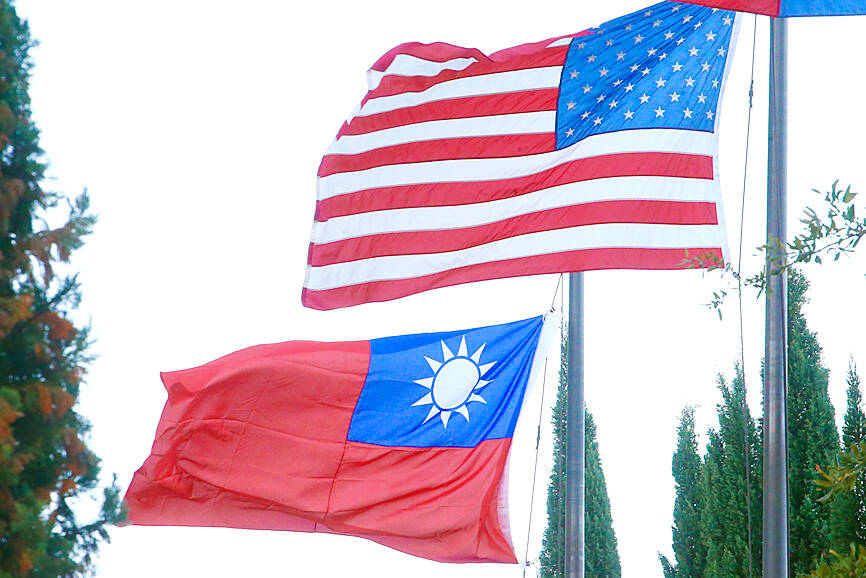The US government is appropriating funding to help Taiwan participate in its International Military Education & Training (IMET) program to enhance interoperability and capabilities for joint operations of the Taiwanse and US militaries.
The funding for Taiwan’s participation in the program is mentioned in the Consolidated Appropriations Act 2023, a US$1.7 trillion spending bill funding the US federal government for the fiscal year 2023. It covers funding for military support for Ukraine, defense spending and regions affected by natural disasters.
The American Institute in Taiwan (AIT) told the Chinese-language Liberty Times (the Taipei Times’ sister newspaper) that IMET is an important US security assistance initiative, which aims to bolster regional defense capabilities and maintain peace by offering professional training and education to military personnel around the world.

Photo: CNA
“IMET has been proven to be an effective means to strengthen the military and international alliances, which are crucial for the US to reach its national security goals,” the institute said.
“The program helps build professional and personal links at the level of defense leaders, who often play key roles during transitions in democratic countries,” it said.
“The program allows defense leaders to reach consensus on the common challenges facing the nations and form partnerships to cope with them,” the institute said.
The program — guided by the US Department of State’s Bureau of Political-Military Affairs and enforced by the US Department of Defense — has over the years been hosting outstanding military officers from Europe, Africa, Asia and Latin America to train with the US military, based on media coverage of the program.
While the act does not reveal details on how Taiwan would participate in the IMET program, diplomatic observers said that it might refer to the military training partnership between Taiwanese armed forces and the US National Guard.
US Senator Tammy Duckworth expressed a high level of interest in forming such a partnership during her two visits to Taiwan last year.
Taiwan’s All-Out Defense Mobilization Agency was reported to have a liaison officer in Washington as part of the Taiwan Military Advisory Group in the US to coordinate related affairs.

MAKING WAVES: China’s maritime militia could become a nontraditional threat in war, clogging up shipping lanes to prevent US or Japanese intervention, a report said About 1,900 Chinese ships flying flags of convenience and fishing vessels that participated in China’s military exercises around Taiwan last month and in January last year have been listed for monitoring, Coast Guard Administration (CGA) Deputy Director-General Hsieh Ching-chin (謝慶欽) said yesterday. Following amendments to the Commercial Port Act (商港法) and the Law of Ships (船舶法) last month, the CGA can designate possible berthing areas or deny ports of call for vessels suspected of loitering around areas where undersea cables can be accessed, Oceans Affairs Council Minister Kuan Bi-ling (管碧玲) said. The list of suspected ships, originally 300, had risen to about

DAREDEVIL: Honnold said it had always been a dream of his to climb Taipei 101, while a Netflix producer said the skyscraper was ‘a real icon of this country’ US climber Alex Honnold yesterday took on Taiwan’s tallest building, becoming the first person to scale Taipei 101 without a rope, harness or safety net. Hundreds of spectators gathered at the base of the 101-story skyscraper to watch Honnold, 40, embark on his daredevil feat, which was also broadcast live on Netflix. Dressed in a red T-shirt and yellow custom-made climbing shoes, Honnold swiftly moved up the southeast face of the glass and steel building. At one point, he stepped onto a platform midway up to wave down at fans and onlookers who were taking photos. People watching from inside

Japan’s strategic alliance with the US would collapse if Tokyo were to turn away from a conflict in Taiwan, Japanese Prime Minister Sanae Takaichi said yesterday, but distanced herself from previous comments that suggested a possible military response in such an event. Takaichi expressed her latest views on a nationally broadcast TV program late on Monday, where an opposition party leader criticized her for igniting tensions with China with the earlier remarks. Ties between Japan and China have sunk to the worst level in years after Takaichi said in November that a hypothetical Chinese attack on Taiwan could bring about a Japanese

The WHO ignored early COVID-19 warnings from Taiwan, US Deputy Secretary of Health and Human Services Jim O’Neill said on Friday, as part of justification for Washington withdrawing from the global health body. US Secretary of State Marco Rubio on Thursday said that the US was pulling out of the UN agency, as it failed to fulfill its responsibilities during the COVID-19 pandemic. The WHO “ignored early COVID warnings from Taiwan in 2019 by pretending Taiwan did not exist, O’Neill wrote on X on Friday, Taiwan time. “It ignored rigorous science and promoted lockdowns.” The US will “continue international coordination on infectious